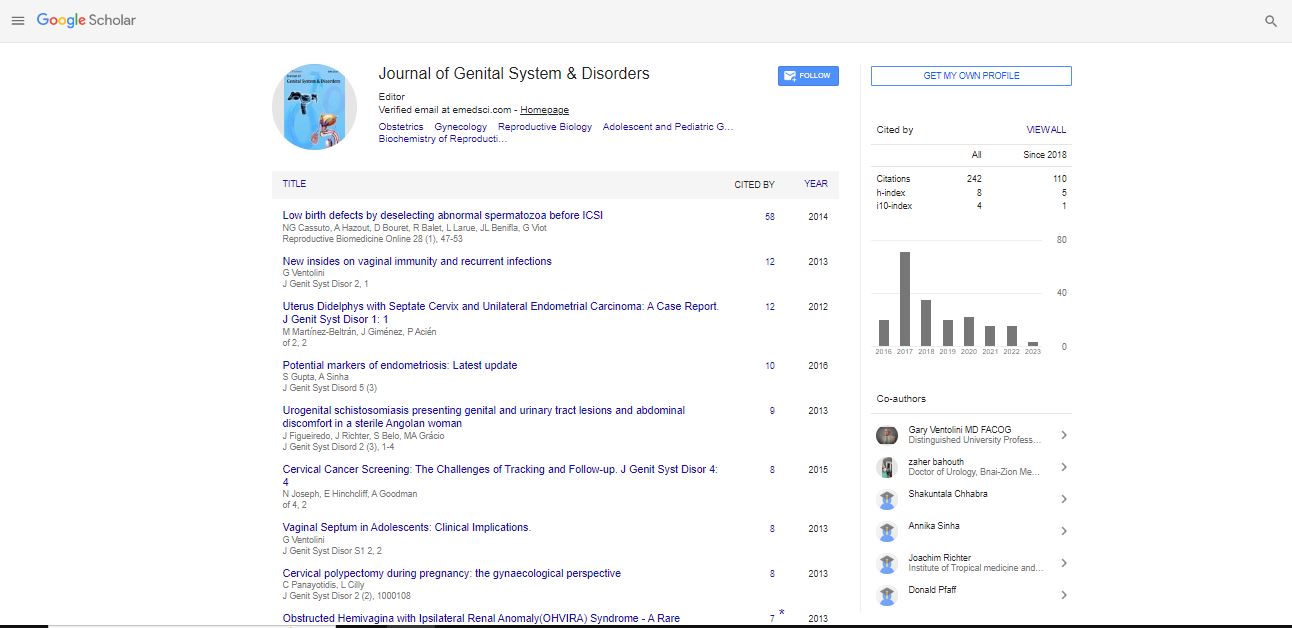Commentary, Vol: 12 Issue: 3
Taking Control of Genital Herpes: Symptoms, Treatment, and Prevention
Wilmara Rampinelli*
1Department of Urology, Tulane University School of Medicine, New Orleans, USA
*Corresponding Author: Wilmara Rampinelli,
Department of Urology, Tulane
University School of Medicine, New Orleans, USA
E-mail: Rampinelli@wilam.edu
Received date: 30 August, 2023, Manuscript No. JGSD-23-117032;
Editor assigned date: 01 September, 2023, PreQC No. JGSD-23-117032 (PQ);
Reviewed date: 15 September, 2023, QC No. JGSD-23-117032;
Revised date: 22 September, 2023, Manuscript No. JGSD-23-117032 (R);
Published date: 29 September, 2023, DOI: 10.4172/2325-9728.1000287
Citation: Rampinelli W (2023) Taking Control of Genital Herpes: Symptoms, Treatment, and Prevention. J Genit Syst Disord 12:3.
Abstract
Description
Genital herpes is a common sexually transmitted infection caused by the Herpes Simplex Virus (HSV). It affects millions of people worldwide and can lead to painful sores, discomfort, and emotional distress. Managing genital herpes effectively requires a comprehensive approach that includes understanding the symptoms, seeking appropriate treatment, and adopting preventive measures. This essay explores the nuances of genital herpes management, focusing on symptoms, treatment options, and prevention strategies. Genital herpes is primarily caused by HSV-2, although HSV-1, the virus responsible for oral herpes, can also cause genital infections through oral-genital contact. HSV-2 is highly contagious, and transmission typically occurs through sexual contact with an infected person, whether or not they have visible sores. The virus can also be transmitted even when there are no noticeable symptoms, making it challenging to prevent its spread.
Symptoms
Symptoms of genital herpes can vary from person to person, and some individuals may remain asymptomatic. However, when symptoms do occur, they generally include:
Painful sores: The most common symptom of genital herpes is the appearance of painful sores or blisters in the genital or anal area. These sores can be highly uncomfortable and distressing for those affected.
Itching and burning: Before the sores develop, many individuals experience itching and burning sensations in the affected area.
Flu-like symptoms: Some people may also experience flu-like symptoms such as fever, headache, and swollen lymph nodes during their initial outbreak.
Recurrent outbreaks: Genital herpes is a chronic condition, and after the initial outbreak, the virus can remain dormant in the body and reactivate periodically, leading to recurrent outbreaks.
Treatment
Managing genital herpes involves various treatment approaches aimed at reducing symptoms, preventing outbreaks, and minimizing the risk of transmission. These treatments include:
Antiviral medications: Antiviral drugs like acyclovir, valacyclovir, and famciclovir can be prescribed to help reduce the severity and duration of outbreaks. They can also be taken daily to suppress recurrent outbreaks.
Pain management: Over-the-counter pain relievers, such as ibuprofen or acetaminophen, can help alleviate the discomfort associated with genital herpes sores.
Topical creams: Some creams and ointments containing ingredients like docosanol may help relieve itching and discomfort during outbreaks.
Good hygiene: Keeping the affected area clean and dry is essential to prevent complications and secondary infections. Avoiding harsh soaps and maintaining proper hygiene practices is important.
Emotional support: Genital herpes can take a toll on one's emotional well-being. Seek support from healthcare providers, counselors, or support groups to cope with the emotional aspects of living with the condition.
Prevention
Preventing genital herpes is a significant challenge, but there are several strategies that individuals can employ to reduce the risk of infection and transmission:
Safety: Consistently using latex or polyurethane condoms during sexual intercourse can reduce the risk of transmission, although they do not provide complete protection, as the virus can still be spread through skin-to-skin contact in areas not covered by the condom.
Knowing your partner's status: Open communication with sexual partners about their herpes status is essential. Testing is advisable for both partners, and sexual activity should be avoided during outbreaks.
Suppressive therapy: Those with recurrent outbreaks can consider daily antiviral medication as a form of suppressive therapy to reduce the risk of transmission to their partners.
Avoiding high-risk behaviors: Avoiding sexual contact when symptoms are present, and not engaging in sexual activity with multiple partners can reduce the risk of transmission.
Regular medical check-ups: Regular check-ups with healthcare providers can help individuals monitor their herpes status and receive appropriate treatment and counseling.
Managing genital herpes symptoms, treatment, and prevention is essential for individuals living with this condition. While there is no cure for genital herpes, antiviral medications and supportive therapies can help control outbreaks and reduce discomfort. Additionally, practicing safe sex, knowing your partner's herpes status, and adopting preventive measures can significantly lower the risk of transmission. Ultimately, a holistic approach to genital herpes management involves physical, emotional, and social components to enable individuals to live healthy and fulfilling lives while managing this chronic condition. Education and awareness are key to reducing the stigma surrounding genital herpes and promoting a healthier approach to its management.
 Spanish
Spanish  Chinese
Chinese  Russian
Russian  German
German  French
French  Japanese
Japanese  Portuguese
Portuguese  Hindi
Hindi 
